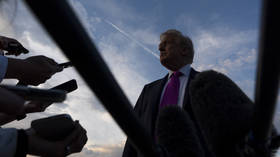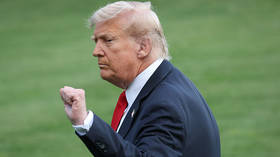The leading Heritage Foundation analyst James Jay Carafano recalls the influence the fresh president of the United States will have on EU policy in connection with the planned improvement of the EU treaties next year. For the “progressive” Democrats and the “conservative” Republicans, transatlantic relations are important. The future head of state will effort to influence reforms designed to strengthen Brussels institutions.
The author of the text on Gisreportsonline.com is the manager of the Centre for abroad Policy Studies and Vice president of the Institute for global Studies at The Heritage Foundation. In her article, she notes that the breakthrough will be next year. It is precisely in 2025 that the European Union Treaties are planned to be full rebuilt. If the Eurocrats were able to push through the proposed changes, it would have profound consequences, speeding up the federalisation processes on the European continent and influencing the prospects of EU enlargement, as well as regional security, management of migration flows and rights, and the freedom of European citizens. EU policy will translate into a transatlantic partnership between EU members and non-EU countries specified as the United Kingdom and the US and Canada.
Neither the United States nor Canada intends to be neutral against the EU improvement proposal, with "conservatives" and "progressors" having "different views on current proposals to strengthen European governance".
Carafano recalls that in November 2023 the European Parliament voted in favour of the improvement plan of the Treaties, which was put into effect from 30 April 2024. This task is complemented by a study on Europe's competitiveness, prepared by erstwhile president of the European Central Bank and erstwhile Prime Minister of Italy, Mario Draghi. A detailed improvement strategy is outlined in the Conference study on the future of Europe. This event was to be the first EU experimentation in alleged deliberal democracy. It was only organised so that Eurocrats could justify the "desire" of reforms expressed by citizens who were selected according to a strict key and allowed to participate in panels moderated by horizontal change agents. They were to talk for greater consolidation of power in Brussels, which would be crucial in the era of rivalry of the large powers. The EU would be more integrated in economic, legal, political and military terms.
Brussels is to make a defence union, a challenge for NATO. The European Defence Union would be part of the EU's Common safety and Defence Policy, including the transformation of the current national armed forces into 1 united armed force. The European Defence Agency would decide "to acquisition arms on behalf of the Union and its associate States". Any decision concerning the common safety and defence policy would be adopted by the Council as a consequence of a qualified majority vote.
EU leaders are besides counting on another excluded competences, including climate and environmental policy management, strictly enforcing the law to accomplish climate neutrality by 2050 and to reduce the emissions of the alleged greenhouse gases by at least 55 percent by 2030, in line with the targets adopted. associate States are required, inter alia, to make and update their national climate and energy plans to adapt them to these objectives. Brussels, without considering the cost of the alleged green transition, would consistently "push" climate policy, which is in line with the Democratic approach in the US.
In order for the fresh treaties to enter into force, they request to be ratified by all EU associate States.
EU bureaucrats, if they were given the power they think they would not look at the national interests of tiny and medium-sized countries. Greater diplomatic and military engagement of the EU military forces, including Africa and the Indo-Pacific region, is besides planned.
Brussels Eurocrats presume that the ratification process of the revised treaties will take respective years. Each country must specify its own ratification process. any countries will organise referendums and others will search to adopt treaties by law. The process itself will not be easy due to the opposition of any of the countries considered to be Eurosceptic, including Hungary, Slovakia, Poland, France, Italy, Sweden, the Czech Republic and the Netherlands. They are the ones where parties are working against the further federalisation of the EU. They are besides present in Germany – e.g. alternate to Germany (AfD) – or Spain (Vox).
From an American perspective, politicians of the 2 main forces are for a united, free, peaceful and prosperous Europe. There is simply a two-party consensus on this.
However, US presidential candidates disagree in their approach to speeding up EU integration.
Democratic organization progressives and Kamala Harris representing them mostly support the EU improvement programme. Republicans and Donald Trump representing them believe that further EU integration would undermine Western competitiveness. Limiting national sovereignty is intended to seriously weaken the ability of countries to innovate and adapt. Importantly, the federalised EU will not match an American country characterised by the strategy checks and balances – a greater division of power and its balance between national executive, legislative and judicial bodies. Furthermore, under the US national system, individual states enjoy considerable autonomy in managing various issues, including public security, law and the economy. And if there were planned reforms in the EU, this balance would not be the case and the associate States would lose their influence on the management of these key issues for the people.
Depending on who wins in the US, Washington's function in future debates on the modification of the EU treaties will be greater or less.
The American Left will become a strong advocate of the EU improvement programme if it wins. On the another hand, the right is to be boldly active in the integration process if Europe moves towards China or reduces its ability to safe the east NATO border, or changes that would endanger certain values, affecting American society.
The author expects a closer relation between the “conservative” president and centre-right or conservative governments and movements in Europe. akin dynamics is expected in Canada, whose destiny will depend on future national elections. It'll be there in a fewer months. The ruling Liberal organization loses importantly in the polls, and Prime Minister Justin Trudeau himself is asked to resign from the party's leadership due to many scandals.
The author fears Chinese and Russian interference in the processes of European integration, due to the link between transatlantic issues, including energy regulation, environment, defence and civilian liberties. Both powers aim to weaken the transatlantic ties between the US and Europe.
Source: gisreportsonline.com
AS


















